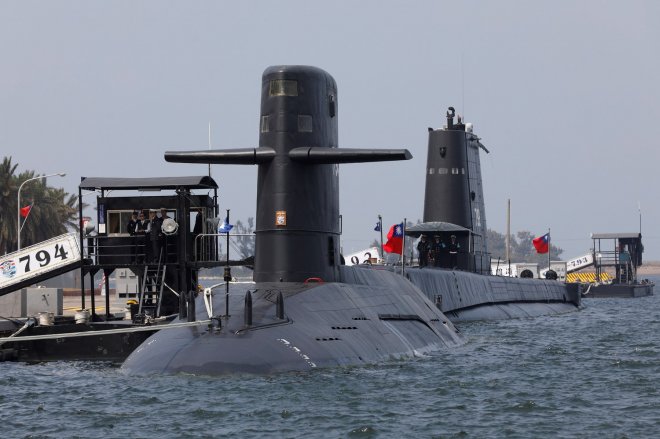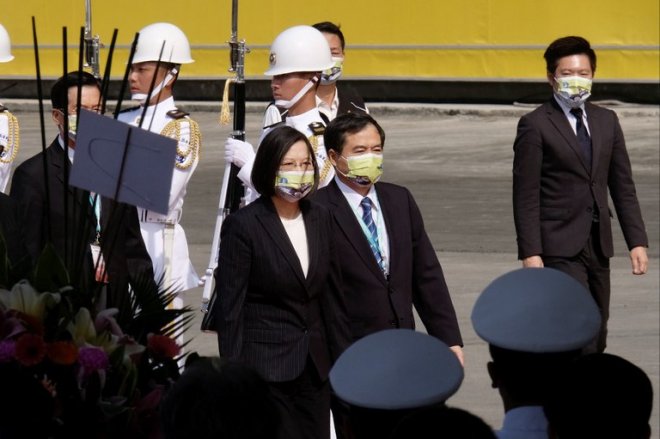
Taiwan’s navy says it is on course to launch its first domestically built submarine by May 2024, amid skepticism about the effectiveness of Taipei’s indigenous submarine program.
Navy Chief of Staff, Vice Adm. Chiang Cheng-kuo, told a legislative budget hearing Monday that a prototype could be launched earlier than the May deadline earmarked in the plan, but the navy wanted to ensure its quality and safety first.
Taiwan started building its Indigenous Defensive Submarine fleet in November 2020 at a new submarine factory in the southern port city of Kaohsiung.
At the inauguration ceremony of the “Made in Taiwan” submarine program, President Tsai Ing-wen said that the submarines would “play a key role in the Navy’s asymmetric warfare capabilities, as well as deterring hostile vessels from encircling Taiwan.”
 Taiwan"s President Tsai Ing-wen (center left) at the inauguration ceremony of the submarine plant in Kaohsiung on Nov. 24, 2020. CREDIT: AFP/ Sam Yeh
Taiwan"s President Tsai Ing-wen (center left) at the inauguration ceremony of the submarine plant in Kaohsiung on Nov. 24, 2020. CREDIT: AFP/ Sam Yeh
In April 2021, the U.S. approved the export of sensitive technology including three major types of equipment — digital sonar systems, integrated combat systems and an auxiliary equipment system (periscopes) – for the fleet.
The plan is to build as many as eight diesel-electric submarines at an estimated cost of U.S. $16 billion but opposition Kuomintang legislators have been calling for a budget freeze on the program, complaining about delays in the upgrading of Taiwan’s existing subs.
Taiwan has a total of four submarines, two of them dating from World War II, making them among the oldest submarines in service in the world. They were transferred from the U.S. during the 1970s.
The other two are the Chien Lung-class Hai Lung (SS-793) and Hai Hu (SS-794) submarines purchased from the Netherlands in the 1980s and in need of a combat upgrade.
The Dutch-made submarines have reportedly been taking part in some of Taiwan’s naval drills in the South China Sea.
Skepticism over indigenous submarines
The new domestic submarines are being constructed at a shipyard owned by Taiwan’s CSBC Corporation under an agreement between the Ministry of National Defense with CSBC and the National Chung Shan Institute of Science and Technology in northern Taiwan.
Some analysts have however raised questions about the effectiveness of the indigenous submarine program.
Liao Hongxiang, a former lecturer at the Taiwan War College, told local media that the contracted company, CSBS, has “no past performance” in building submarines.
“Since Taiwan has absolutely no experience in the design and manufacture of submarine subsystems, the unit price of each diesel-electric submarine is more than twice that of other countries" similar submarines,” Liao said.
There is a large gap between the submarine forces of Taiwan and China and, according to the analyst, even with eight new submarines, the Taiwanese Navy still cannot compete with the People’s Liberation Army Navy’s fleet.
China is believed to have around 70 submarines, including a dozen that are nuclear-powered. The number of Chinese nuclear submarines is likely to increase to 21 by 2030, according to the U.S. Office of Naval Intelligence.
Instead of acquiring new subs, Liao suggested that the Navy could deploy surveillance systems to early detect enemy submarines in Taiwan’s waters and use smart naval mines and long-range anti-submarine rockets to neutralize them.
Grant Newsham, a retired U.S. Marine colonel who spent a year studying Taiwan’s defense system, also suggested sea mines, “especially the "smart" kinds.”
